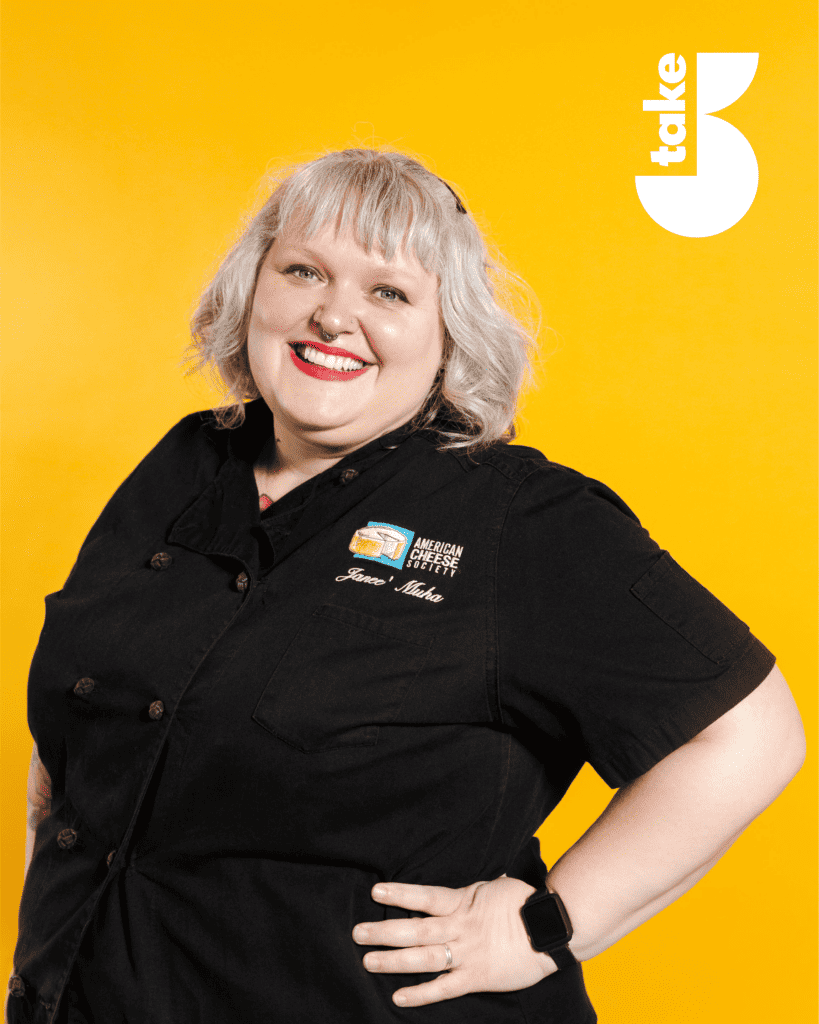Take 5: Highlighting the apprenticeship “breaks” of cheese industry pros
In this ongoing series, culture profiles folks in the cheese industry expanding their expertise and gaining diverse experience beyond their time behind the counter or at a vat.

As a cheesemonger for hire, photographer, business owner, and host of The Mobile Monger podcast, Janeè Muha embodies the dynamic nature of the world of cheese. Recently, Muha stepped away from her multifaceted career to spend a month working on the production floor at Uplands Cheese in Dodgeville, Wisconsin. The internship, made possible by the Cheeseletes Back in the Vat Grant, allowed her to explore cheese production firsthand, gaining invaluable insights and reaffirming her passion for producer advocacy.
Culture Media (CM): What made you want to take a break from your daily life to participate in this internship?
Janeè Muha (JM): I’m fortunate enough to have a very flexible schedule that can accommodate a month-long internship, and I had been telling Andy for years that I would come out for a more extended period if I had a place to stay. Getting the Cheeseletes grant helped me afford the drive and the place to stay, which helped address two of the biggest obstacles surrounding that goal. I have never worked on production before, so getting in there was necessary to understand the process. I’m a visual learner, and things stick better in my head when I can do them. There is also something about the daily grind of a job that you need to see to understand how it works fully. I’ve helped wrap cheese and been in make rooms before, but spending a month shines a different light on the work.
CM: What was an unexpected challenge you faced during the internship?
JM: The most unexpected challenge for me was the time to be in your head while working. I’m used to a busy environment where you have a million things happening at once, and much of the work in the cheese room is maybe with one other person getting through racks of cheese that need to be flipped or brushed. It leaves a lot of time for thinking. The work isn’t hard but repetitive, meaning it’s easy to zone out and get in your head. This is likely affected by the fact that I have had a challenging year where distractions are currently welcome, but my many years of retail have always allowed for constant movement.
CM: What was your major takeaway from this experience?
JM: A major takeaway from this internship is that, especially for soft cheeses, the number of times the cheese is touched is far greater than you think. I knew that a cheese like Rush Creek would get handled quite a few times in its short life, but the actual number is likely double what I thought. And that number was coming from an educated guess!
CM: How has this experience impacted your future career goals?
JM: My future career goals revolve around advocating for producers, and getting behind the scenes can help me better tell the story. Having the working knowledge of the day-in and day-out will better help me communicate the difficulties that cheesemakers face daily. It allows me to think critically about how to convey these struggles best and present them in appealing ways. I’ve always deeply appreciated cheesemakers’ work, but seeing behind the curtain has given me a broader perspective and will ultimately make me a better cheesemonger.
CM: Did this internship change your overall view of the cheese/food industry at large?
JM: I’ve always known that we all have our place in the ecosystem of food, but I’ve gained an appreciation for being able to find a path that best works with differing lifestyles. I will never be a cheesemaker because I need a constant flow of human interaction and distraction, but others have their batteries drained by that same thing. Seeing both sides reaffirms where I am in my career and can help me guide others when thinking about where they want to go. Also, I’ve always known the backbreaking work it takes to get this delicious food to our tables, but it never hurts to be reminded of it, especially in such a physical way. The sense of pride I’ve been feeling as I see Rush Creek on social media being sold and enjoyed at customers’ tables is something else that helps me understand how cheesemakers feel as they release their cheese into the world. Knowing I’ve had my hands on it and have helped guide the milk to this final state makes me feel accomplished in a way I don’t get often.



